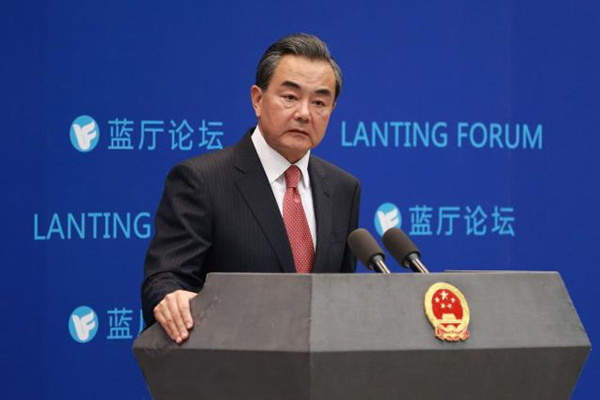
Chinese Foreign Minister Wang Yi (Photo/Xinhua)
Foreign Minister says trip will enhance trust
Positive interaction and mutually beneficial cooperation between China and the U.S. in the Asia-Pacific region are "absolutely possible and necessary", Foreign Minister Wang Yi said on Wednesday.
The minister made the comment ahead of President Xi Jinping's first state visit to the United States next week.
Ministry spokesman Lu Kang announced earlier in the day that the visit will be from next Tuesday to Friday. After this, Xi will attend a series of summits in New York from Sept 26 to 28 related to the 70th anniversary of the founding of the United Nations.
White House spokesman Josh Earnest said on Tuesday that U.S. President Barack Obama and first lady Michelle Obama will host Xi and his wife Peng Liyuan at a state dinner on Sept 25.
Wang told a forum at the ministry on Wednesday that Xi's visit will "help to enhance trust and reduce misgivings", and the positive interaction between the two nations "meets the expectations of other countries in the region".
Last year, about 4.3 million mutual visits were made between China and the U.S.. There is a flight between the two countries every 17 minutes.
Wang said, "The two countries will use such opportunities to reaffirm their respective development direction and strategic intentions, their growing common interests and their common responsibility for peace, stability and development."
Addressing the potential highlights of the state visit, Wang said both countries will "strive for new and important progress" in Bilateral Investment Treaty negotiations, and many cooperation agreements with "far-reaching impacts" will be signed.
Consensus will be reached in key areas including economy and trade, energy, people-to-people exchanges, climate change, environmental protection, finance, science and technology, agriculture, law enforcement, defense, aviation and infrastructure development, Wang said.
Su Ge, president of the China Institute of International Studies, estimated that talks on a smaller scale between Xi and Obama "will be an occasion to facilitate exchanges on the real intentions of either country".
As the relationship is embracing a "new normal", it will take time for both to get accustomed to it, Su said.
Yuan Peng, vice-president of the China Institute of Contemporary International Relations, said the two countries should exercise control over problematic issues that cannot be resolved quickly.
Ruan Zongze, vice-president of the institute, suggested that both countries could "convert controversial issues into chances for cooperation", referring to cyberspace issues as a new opportunity for bilateral cooperation.
Wang said that during the high-level UN events Xi will put forward initiatives to contribute to the advancement of the welfare of the "peoples of the United Nations".
At the end of last year, Xi put forward a vision for building a new type of international relations featuring "win-win cooperation".
Wang said that during this visit, Xi will elaborate fully, for the first time at the UN headquarters, on this new vision.
Wang Yizhou, a professor of international relations at Peking University, said that during the past 70 years China has "grown from a marginalized country to a major one with a strong sense of responsibility".


















































